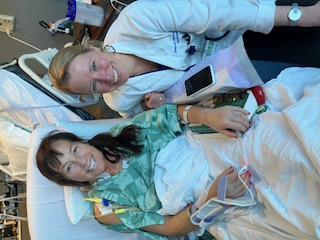
Request a Referral
* View our call center hours
Please visit our privacy policy for more information.
Marathon Runner Gail Jarvis Was an Unlikely Transplant Candidate - Until VT Changed Everything
Gail Jarvis’s case shows that a normal ejection fraction (EF) can mask severe cardiac disease—and that early subspecialist care can fundamentally alter a patient’s prognosis. A lifelong athlete and marathon runner, Jarvis presented with a rare genetic cardiomyopathy. She ultimately received a life-saving heart transplant through the coordinated efforts of Emory Healthcare’s multidisciplinary advanced heart failure and transplant cardiology team.
“Patients like Jarvis do not fit the traditional profile,” says Annie van Beuningen, MD, medical director of the Heart Transplant program at Emory.
“Patients like Jarvis do not fit the traditional profile,” says Annie van Beuningen, MD, medical director of the Heart Transplant program at Emory.
“She was doing yoga the day of her transplant— but that was the definitive cure for her disease. Without a heart transplant, she almost certainly would have died much earlier than she should have, well before her expected life span.”
Jarvis was diagnosed with arrhythmogenic right ventricular cardiomyopathy (ARVC) following the sudden cardiac death of a relative, which led to cascade genetic testing. Although genotype-positive, she was initially asymptomatic.
“ARVC is a disease that can be classically unmasked by endurance or competitive athletics,” says Dr. van Beuningen. “She was a marathon runner. It is impossible to say definitively, but running likely contributed to the expression of the disease she had had since birth.”
“ARVC is a disease that can be classically unmasked by endurance or competitive athletics,” says Dr. van Beuningen. “She was a marathon runner. It is impossible to say definitively, but running likely contributed to the expression of the disease she had had since birth.”
Early Referral and Evaluation
Initially, Jonathan Kim, MD, a sports cardiologist at Emory, provided structured, low-impact exercise guidance. Then, despite years of disease stability, Jarvis’s condition rapidly deteriorated in 2023 with the onset of intractable ventricular tachycardia (VT), resulting in multiple implantable cardioverter-defibrillator (ICD) shocks. After unsuccessful medical and device-based rhythm management, she was referred to Emory’s advanced heart failure service, where cardiopulmonary stress testing and clinical decline confirmed the need for transplant evaluation.
“By that point, I was convinced that she would not survive without a transplant,” says Dr. van Beuningen. “Her VT was incessant, life-threatening, and non-responsive to our standard therapies.”
Finding a Match
Jarvis’s transplant candidacy was complicated by a high panel reactive antibody (PRA) score—approximately 98–99%. “This meant that 98–99% of donors would be an immunologic mismatch,” says Dr. van Beuningen.
Her sensitization was likely related to prior pregnancies, a known but unpredictable risk factor for alloimmunization. She was otherwise considered an ideal transplant candidate—fit, engaged, adherent—but the antibody profile presented a barrier.
The Emory team explored desensitization protocols using agents commonly used in hematologic malignancies. However, insurance repeatedly denied coverage, even after letters from the Emory team reached as far as the New York Governor’s office.
A Matched Donor and a Seamless Transplant
A donor match emerged in February 2024.
"It was an excellent match, but there was actually one antibody mismatch," says Dr. van Beuningen. "It was a little bit higher risk from an immunologic standpoint. She required much thought — we used a slightly modified medical management strategy for her after transplant then we would our standard."
The transplant, performed by Emory cardiothoracic surgeon Tamer Attia, MD, proceeded without surgical complication.
"It was an excellent match, but there was actually one antibody mismatch," says Dr. van Beuningen. "It was a little bit higher risk from an immunologic standpoint. She required much thought — we used a slightly modified medical management strategy for her after transplant then we would our standard."
The transplant, performed by Emory cardiothoracic surgeon Tamer Attia, MD, proceeded without surgical complication.
Clinical Lessons for Referring Providers
Jarvis's case underscores several key points for physicians managing patients with genetic or athletic cardiomyopathies:
- Phenotype over genotype: Jarvis was initially asymptomatic with a normal EF. Her decline was driven by arrhythmic instability, not pump failure—highlighting the need to evaluate the disease beyond traditional heart failure markers.
- Early subspecialty referral matters: Access to sports cardiology and cardiopulmonary exercise testing (CPET) helped detect subtle declines in performance not easily appreciated in highly trained athletes.
- Transplant eligibility is nuanced: Even with a normal EF, patients with refractory arrhythmias may be candidates for transplantation if symptoms are life-limiting and not medically manageable.
- Comprehensive care improves outcomes: Jarvis's trajectory—from evaluation through transplant—was navigated by Emory's multidisciplinary cardiology team, which includes genetic testing, sports cardiology, electrophysiology, surgery, and transplant care.
Refer a patient to an Emory heart failure specialist.
Call our physician referral line at 404-778-5050
Refer a Patient
* View our call center hours
Please visit our privacy policy for more information.
Refer a Patient
* View our call center hours
Please visit our privacy policy for more information.




